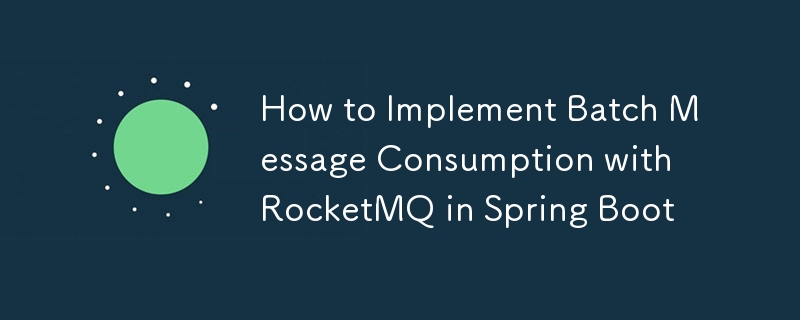
First, add the necessary dependencies to your pom.xml file:
org.apache.rocketmq rocketmq-spring-boot-starter 2.3.1 org.apache.rocketmq rocketmq-client org.apache.rocketmq rocketmq-client 5.3.0
Configure your RocketMQ settings in the bootstrap.yaml file:
rocketmq: name-server: 192.168.1.1:9876;192.168.1.2:9876;192.168.1.3:9876 # Replace with actual NameServer addresses consumer: group: consume-group-test access-key: access # Configure if ACL is used secret-key: secret consume-message-batch-max-size: 50 # Max messages per batch pull-batch-size: 100 # Max messages pulled from Broker topics: project: "group-topic-1" groups: project: "consume-group-1" # Use different groups for different business processes
Create the configuration class MqConfigProperties:
import org.apache.rocketmq.spring.autoconfigure.RocketMQProperties; import org.springframework.beans.factory.annotation.Autowired; import org.springframework.boot.context.properties.ConfigurationProperties; import org.springframework.stereotype.Component; import lombok.Data; import java.io.Serializable; /** * RocketMQ Configuration Class */ @Data @Component @ConfigurationProperties(prefix = "rocketmq") public class MqConfigProperties implements Serializable { private static final long serialVersionUID = 1L; @Autowired private RocketMQProperties rocketMQProperties; private TopicProperties topics; private GroupProperties groups; /** * Topic Configuration Class */ @Data public static class TopicProperties implements Serializable { private static final long serialVersionUID = 1L; private String project; } /** * Consumer Group Configuration Class */ @Data public static class GroupProperties implements Serializable { private static final long serialVersionUID = 1L; private String project; } }
Create the consumer class UserConsumer:
import com.alibaba.fastjson2.JSONObject; import org.apache.rocketmq.client.consumer.DefaultMQPushConsumer; import org.apache.rocketmq.client.consumer.listener.ConsumeConcurrentlyContext; import org.apache.rocketmq.client.consumer.listener.ConsumeConcurrentlyStatus; import org.apache.rocketmq.client.consumer.listener.MessageListenerConcurrently; import org.apache.rocketmq.client.consumer.rebalance.AllocateMessageQueueAveragely; import org.apache.rocketmq.common.consumer.ConsumeFromWhere; import org.apache.rocketmq.common.message.MessageExt; import org.apache.rocketmq.remoting.RPCHook; import org.apache.rocketmq.spring.support.RocketMQUtil; import org.springframework.context.ApplicationContext; import org.springframework.context.SmartLifecycle; import org.springframework.stereotype.Component; import lombok.extern.slf4j.Slf4j; import javax.annotation.Resource; import java.util.List; /** * Batch Consumer Implementation */ @Component @Slf4j public class UserConsumer implements SmartLifecycle { @Resource private MqConfigProperties mqConfigProperties; @Resource private ApplicationContext applicationContext; private volatile boolean running; private DefaultMQPushConsumer consumer; @Override public void start() { if (isRunning()) { throw new IllegalStateException("Consumer is already running"); } initConsumer(); setRunning(true); log.info("UserConsumer started successfully."); } @Override public void stop() { if (isRunning() && consumer != null) { consumer.shutdown(); setRunning(false); log.info("UserConsumer stopped."); } } @Override public boolean isRunning() { return running; } private void setRunning(boolean running) { this.running = running; } private void initConsumer() { String topic = mqConfigProperties.getTopics().getProject(); String group = mqConfigProperties.getGroups().getProject(); String nameServer = mqConfigProperties.getRocketMQProperties().getNameServer(); String accessKey = mqConfigProperties.getRocketMQProperties().getConsumer().getAccessKey(); String secretKey = mqConfigProperties.getRocketMQProperties().getConsumer().getSecretKey(); RPCHook rpcHook = RocketMQUtil.getRPCHookByAkSk(applicationContext.getEnvironment(), accessKey, secretKey); consumer = rpcHook != null ? new DefaultMQPushConsumer(group, rpcHook, new AllocateMessageQueueAveragely()) : new DefaultMQPushConsumer(group); consumer.setNamesrvAddr(nameServer); consumer.setConsumeFromWhere(ConsumeFromWhere.CONSUME_FROM_LAST_OFFSET); consumer.setConsumeMessageBatchMaxSize(100); // Set the batch size for consumption consumer.subscribe(topic, "*"); consumer.setMessageListener(new MessageListenerConcurrently() { @Override public ConsumeConcurrentlyStatus consumeMessage(List msgs, ConsumeConcurrentlyContext context) { log.info("Received {} messages", msgs.size()); for (MessageExt message : msgs) { String body = new String(message.getBody()); log.info("Processing message: {}", body); User user = JSONObject.parseObject(body, User.class); processUser(user); } return ConsumeConcurrentlyStatus.CONSUME_SUCCESS; } }); consumer.start(); log.info("UserConsumer initialized with topic [{}] and group [{}].", topic, group); } private void processUser(User user) { log.info("Processing user with ID: {}", user.getId()); // Handle user-related business logic } }
To produce batch messages, you can use the following UserProducer class:
import org.apache.rocketmq.client.producer.DefaultMQProducer; import org.apache.rocketmq.common.message.Message; import java.util.ArrayList; import java.util.List; public class UserProducer { private DefaultMQProducer producer; public void sendBatchMessages(List users, String topic) { List messages = new ArrayList<>(); for (User user : users) { messages.add(new Message(topic, JSONObject.toJSONString(user).getBytes())); } try { producer.send(messages); } catch (Exception e) { log.error("Error sending batch messages", e); } } }
Performance Optimization:You can adjust the size of the consumer thread pool. By default, it's set to consumeThreadMin=20 and consumeThreadMax=20. In high-concurrency scenarios, increasing the thread pool size can enhance performance.
Error Handling:When consumption fails, be cautious with RECONSUME_LATER to avoid infinite retry loops. Set a maximum retry count based on your business requirements.
Tenant Isolation:Use different groups for different business modules to avoid consuming data from the wrong group. This is especially crucial in production environments.
以上是How to Implement Batch Message Consumption with RocketMQ in Spring Boot的详细内容。更多信息请关注PHP中文网其他相关文章!




